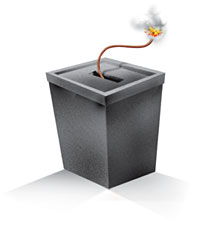|
|
The king could have banned parties, scrapped the constitution, declared martial law. But he decided to tell sceptical subjects how much things have improved since he took over.
Unlike previous addresses the king was soft on the mainstream parties, he didn't abuse \'terrorists\' too much and even spared the international community. This has given a glimmer of hope that the king meant it when he said he wanted to bury \'past bitterness\'.
But things may be too far gone for the political party leadership to join the king without him first handing power back to an interim government acceptable to all that would supervise future general elections. The parties suspect the king is firmly set on his three-year timetable for a kind of democracy that would keep him in charge. The king for his part seems determined not to hand power to the present crop of political leaders.
"The distance between the king and the parties continues to widen and next week's elections will make things much worse," says Prakash Chandra Lohani of the Rastriya Janashakti Party.
While the parties and the palace circle each other, the Maoists are pressing ahead with their campaign to bring the war to the cities with the devastating attack on Tansen on Tuesday and publicly warning about attacks in the Valley next week.
In the worst-case scenario, the Maoists will ride the parties' agitation to create trouble and provoke brutal crackdowns by the security forces, which they hope will escalate into a street uprising. In the chaos, the state will not be able to distinguish between party activists and Maoists, leading to urban guerrilla warfare.
The parties, driven to desperation by the regime's crackdown on democracy, don't seem to see the danger. "Let the government impose curfews, the more it does so the more successful our movement becomes," KP Oli of the UML said at a forum this week.
But in private, other senior party leaders told us they are aware of being squeezed between the Maoists and the royal regime and that a further escalation in violence would give the regime the excuse to crack down even more.
"When constitutional forces like the parties are hand in glove with unconstitutional forces like the Maoists, it will only help terrorism," warns political analyst Shastra Dutta Panta. Prolonged street unrest will further undermine the economy and increase public discontent that could boil over into the streets.
"When the people do not get basic necessities to survive, they will certainly come out on the streets, which could lead to civil unrest," predicts economist Raghab D Pant, whose Institute for Development Studies brought out a report that warns of civil unrest fuelled by economic collapse.
Seriously worried
. The UN system in Nepal expressed deep concern on Thursday that 75 polling stations for next week\'s elections will be located in school buildings. 'If schools become a place where the conflict is fought out, then they are no longer safe as places of education,' the statement said.
. Javier Solana, EU High Representative for the Common Foreign and Security Policy, in a statement timed for 1 February expressed concern about the lack of progress in returning democracy. \'The sad failure by the king and his government to declare a truce and to engage in dialogue at the time of the recent Maoist unilateral ceasefire was an opportunity missed,' Solana added.
. The Commander of US Pacific Command, Admiral William J Fallon, met King Gyanendra and senior military and other officials Wednesday. He said before leaving: "Reconciliation between the king and the parties is not only indispensable to bring back democracy but also to effectively address the insurgency by the Maoists."
. President of the International Federation of Journalists (IFJ) Christopher Warren said of the detention of journalists on Wednesday: "The violent intervention of police and the targeting of journalists during peaceful protests is totally unacceptable."
. Amnesty International called on the royal regime to release immediately and unconditionally all those who have been detained for the peaceful exercise of their rights during a crackdown on the political opposition over the past two weeks.



